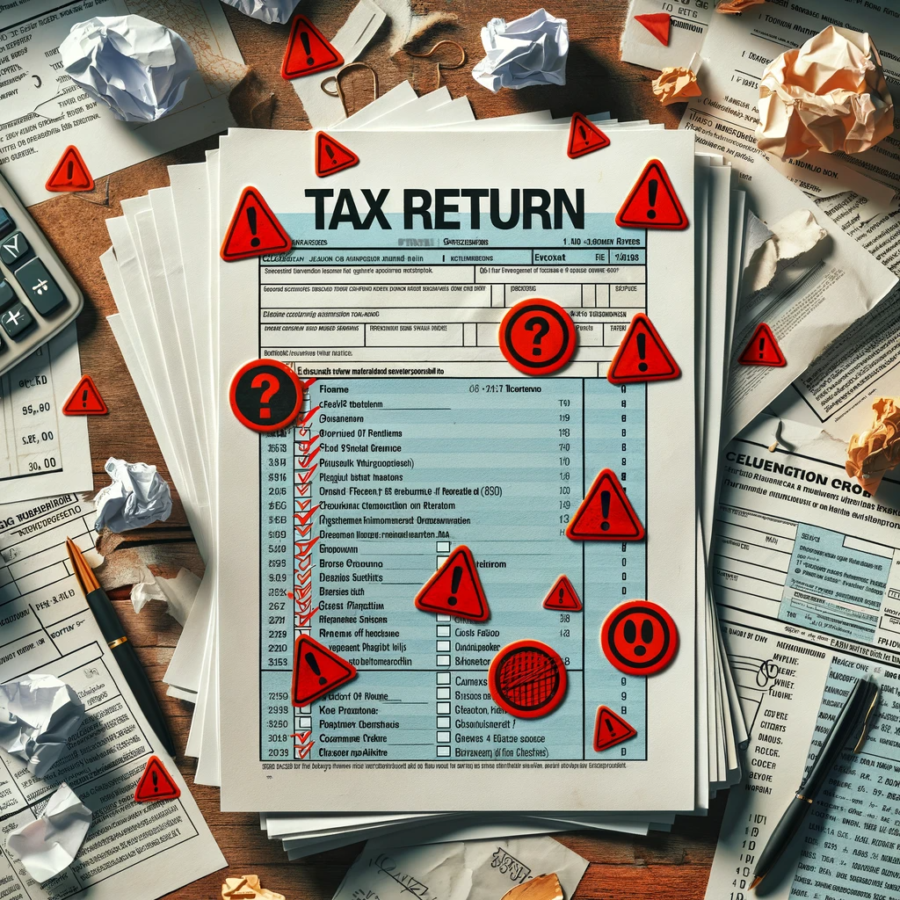
The penalty for filing a false tax return is steep. Fines for tax fraud are high, and depending on whether the person knew the information was fraudulent, jail time can even be part of the equation. While incarceration may not happen if the false data was due to a misstep, penalties can still come if the return contains errors. Here’s a look at five mistakes that can cause you big penalties for filing a false tax return.
1. Claiming the Wrong Deductions

When filling out tax forms, filers are usually presented with a list of possible deductions to claim. Selecting deductions you aren’t qualified for as a means of reducing what you owe is a type of tax fraud, so including them means you’re filing a false tax return.
Admittedly, figuring out whether you’re eligible for some deductions is complex. That’s why it’s best to consult with a professional before claiming it if you’re uncertain whether a specific deduction applies to you and your situation.
2. Listing Personal Expenses and Business Expenses

Many people have the option of recording their business expenses as deductions if they operate a company or are self-employed. However, only costs associated with business operations must be claimed on a tax return. Personal expenses aren’t eligible for a deduction, so listing a cost associated with a personal expenditure can cause someone to file a false tax return.
Generally, business expenses are anything ordinary and necessary for operating a company (or self-employed venture) in the industry you’re working within. Precisely what’s eligible does vary depending on the type of company a person runs. Additionally, there are limitations if an item is used for business and personal purposes. Again, if you’re unsure whether an expense is legitimately a business one, consult with a professional.
3. Not Reporting All Income

One of the biggest mistakes a person can make that can cause them to file a false tax return is not including all of their income on the forms. A wide variety of income sources are taxable beyond traditional jobs or earnings related to running a business.
For example, earnings from online surveys are taxable income, even if the rewards are provided in the form of gift cards or gifts and not just cash. Selling crafts that are part of a hobby and not a formal business can lead to taxable income, too.
That’s why it’s critical to think about all earnings related to your activities. That way, you don’t accidentally miss reporting income and end up accidentally filing a false tax return.
4. Math Mistakes

If you do your tax return by hand, you’re usually doing quite a bit of math to calculate your obligation and determine if it’s met. Even if you’re using a calculator, math mistakes can happen. You might type the wrong figure into the calculator or misunderstand how the calculation is done, leading to incorrect figures on your tax return. Then, if those are submitted, you’ve filed a false tax return.
Math mistakes are less common if you use tax software or go to a tax preparer to handle your return, but they can occur. Usually, they’re the result of accidentally entering the wrong figure when providing information, causing any subsequent calculations to be incorrect in comparison to what they should come out to if the right information was given.
In either case, reviewing every entry, figure, and calculation before submitting a tax filing is a must. That way, you can avoid or identify and correct math mistakes before you finish the paperwork and send it to the IRS.
5. Incorrect Social Security Numbers

Listing a Social Security Number other than your own (and other household members listed on the same return) when you file your taxes means you’ve filed a false tax return. Often, this issue is accidental, as it’s easy to transpose numbers or fat-finger your SSN when entering it. However, some people include the wrong Social Security Numbers intentionally, which is why mistakes of this nature are often treated as potential fraud.
Generally, your best option here is to double (or even triple) check any SSNs you add to your tax return before submitting it. That ensures you catch any mistakes before the forms go to the IRS.
Since the penalty for filing a false tax return is steep, do you have any tips that can help people avoid costly mistakes? Did you ever make a misstep on your taxes that led to consequences and want to tell others about your experience? Share your thoughts in the comments below.
Read More:
Come back to what you love! Dollardig.com is the most reliable cash-back site on the web. Just sign up, click, shop, and get full cash back!
Tamila McDonald is a U.S. Army veteran with 20 years of service, including five years as a military financial advisor. After retiring from the Army, she spent eight years as an AFCPE-certified personal financial advisor for wounded warriors and their families. Now she writes about personal finance and benefits programs for numerous financial websites.
Comments